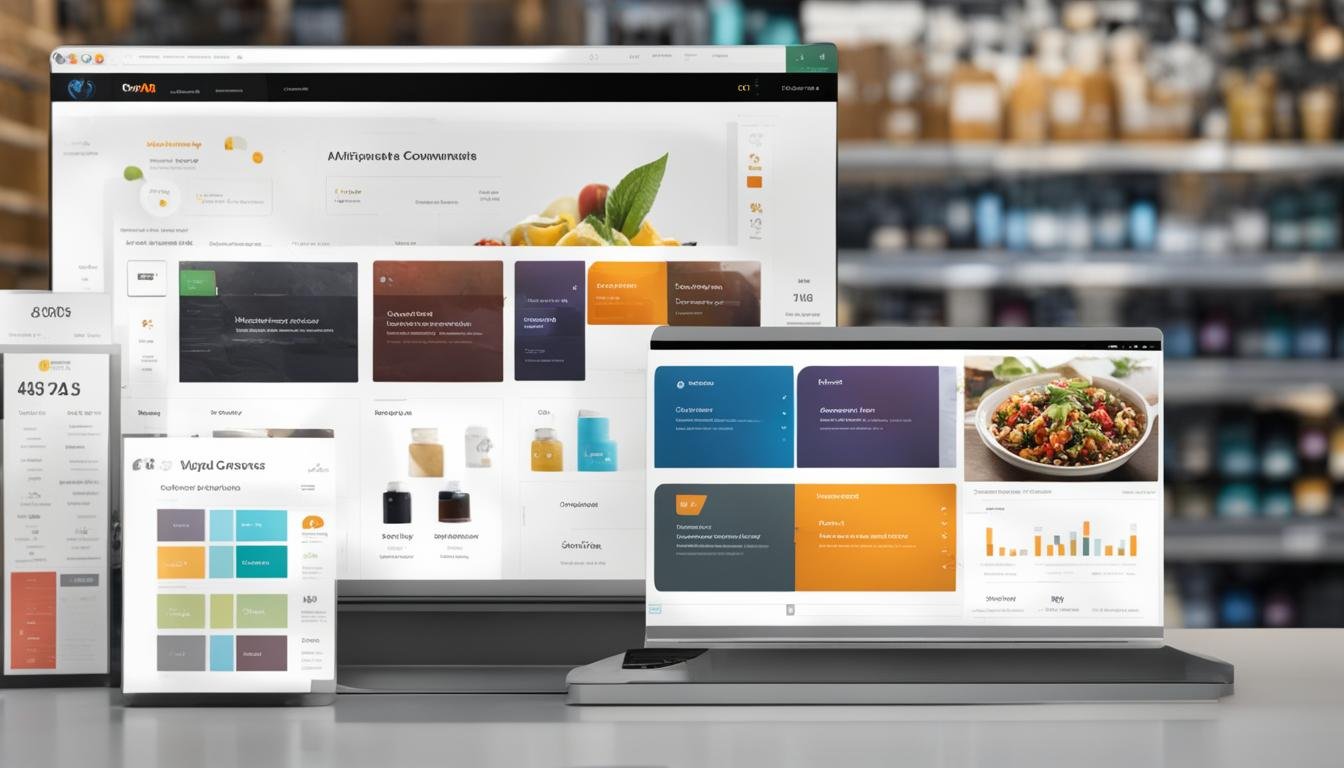Are you a B2B business looking to accelerate your growth and streamline your wholesale transactions? Choosing the right eCommerce software is crucial for success in today’s digital business landscape. With the global B2B eCommerce market projected to reach $22 billion by 2030 and the USA alone expected to reach $1.8 trillion in 2023, it’s clear that investing in the right platform is essential.
But with so many options available, how do you determine which B2B eCommerce software is the best fit for your business? In this article, we will delve into the key features and capabilities of the top B2B eCommerce platforms in the market to help you make an informed decision.
Key Takeaways:
- Choosing the right B2B eCommerce software is crucial for business growth and streamlined wholesale transactions.
- The global B2B eCommerce market is projected to reach $22 billion by 2030.
- Investing in the right platform is essential to tap into the $1.8 trillion B2B eCommerce market in the USA.
- This article will explore the key features of the top B2B eCommerce platforms available.
- Make an informed decision based on your business needs and growth aspirations.
Understanding B2B eCommerce Platforms
B2B eCommerce is a complex process where businesses provide convenient services to other companies. This includes personalized pricing, clear documentation, efficient money flow, and exceptional service. The success of B2B eCommerce depends on the capabilities of the software platform being used. B2B eCommerce involves a wide range of industries, from distributors to manufacturers, and encompasses various business models like B2B, B2B2C, and B2G.
Considering Your Business Needs
Before choosing a B2B eCommerce platform, it is important to understand your specific business needs. By carefully analyzing your requirements and considering key factors, you can make an informed decision that aligns with your goals and objectives.
Types of Products or Services
Consider the types of products or services you offer as a B2B merchant. Whether you specialize in selling physical goods or provide digital solutions, different eCommerce platforms may offer specific features tailored to your industry.
Wholesale or Retail Model
Determine whether your business operates primarily in a wholesale or retail model. Some B2B eCommerce platforms are designed specifically for wholesale eCommerce, offering features such as bulk ordering, tiered pricing, and customizable catalogs.
Marketplace Functionality
If you require a marketplace functionality where multiple vendors can sell their products on your platform, it is essential to choose a B2B eCommerce platform that supports this feature. This can enable you to expand your product offering and attract a wider range of customers.
Customization and Scalability
Assess the level of customization and scalability your business requires. Look for platforms that allow you to tailor the user experience, design, and functionality to meet your specific needs. Scalability is also crucial, as your business may grow and evolve over time.
By carefully evaluating these factors, you can select the best eCommerce platform for your B2B company. The next section will explore the essential features to consider when choosing a B2B eCommerce platform.
Essential Features of B2B eCommerce Software

In order to thrive in the competitive B2B eCommerce market, businesses require a robust commerce platform that caters specifically to their needs. A comprehensive B2B sales platform should encompass a range of essential features and capabilities to enable seamless online transactions and drive growth for B2B eCommerce companies.
Here are some key features that a top-notch B2B eCommerce solution should offer:
- Modularity for Flexible Growth and Scalability: A B2B eCommerce platform should provide modular architecture, allowing businesses to add or customize features based on evolving requirements. This flexibility ensures scalability for future growth and enables businesses to adapt to changing market needs.
- Headless Architecture for Omnichannel Support: With the increasing demand for cross-channel experiences, a headless architecture is crucial to enable seamless integration across various touchpoints. It allows businesses to deliver consistent and personalized experiences to B2B buyers, regardless of the device or channel they are using.
- Integrations with Third-Party Solutions: To enhance functionality and streamline operations, a B2B sales platform should offer integrations with various third-party solutions such as CRM, ERP, payment gateways, and shipping providers. These integrations simplify processes and help businesses optimize their workflow.
- Customization Capabilities to Meet Unique Business Scenarios: Every B2B business is unique, and the eCommerce platform should provide extensive customization capabilities to meet specific business requirements. It should allow businesses to tailor the user interface, pricing rules, product catalogs, and workflows according to their needs.
- A Powerful Extensibility Framework: An extensible B2B solution enables businesses to extend its core functionality by building custom integrations or creating new features using APIs and SDKs. This capability allows businesses to adapt the platform to their unique workflows and extend its capabilities as their needs change over time.
- Multi-Regional Support: As B2B transactions span across different regions, a B2B eCommerce platform should provide multi-regional support, including multi-language and multi-currency capabilities, to cater to global customers and facilitate international business operations.
- Cloud-Native Approach: A cloud-native B2B eCommerce platform offers scalability, security, and high availability. It eliminates the need for businesses to invest in on-premise infrastructure and allows them to focus on their core competencies while leaving the infrastructure management to the platform provider.
- Option for Open-Source Platforms: Open-source platforms provide businesses with the freedom to modify the source code and customize the platform according to their specific needs. This option is ideal for businesses that require full control over their eCommerce solution and have dedicated development resources.
A comprehensive B2B solution with these essential features empowers eCommerce companies to optimize their B2B transactions, streamline operations, and deliver exceptional experiences to their B2B buyers.
| Feature | Description |
|---|---|
| Modularity for Flexible Growth and Scalability | Allows businesses to add or customize features for future growth and adaptability |
| Headless Architecture for Omnichannel Support | Enables seamless integration across various touchpoints for consistent and personalized experiences |
| Integrations with Third-Party Solutions | Simplifies processes and optimizes workflow through seamless integration with CRM, ERP, payment gateways, and shipping providers |
| Customization Capabilities | Allows businesses to tailor the user interface, pricing rules, product catalogs, and workflows according to their needs |
| A Powerful Extensibility Framework | Enables businesses to extend the core functionality and create custom integrations or new features using APIs and SDKs |
| Multi-Regional Support | Provides multi-language and multi-currency capabilities to cater to global customers and facilitate international business operations |
| Cloud-Native Approach | Offers scalability, security, and high availability without the need for on-premise infrastructure |
| Option for Open-Source Platforms | Provides businesses with the flexibility to modify the source code and customize the platform according to their needs |
Top B2B eCommerce Platforms for 2023: The Expert Review

In this section, we will provide an expert review of the leading B2B eCommerce platforms available in 2023. These platforms have been carefully evaluated based on their strengths, weaknesses, and features specifically designed for manufacturers, wholesalers, and B2B businesses. By comparing the top B2B eCommerce platforms, businesses can make an informed decision and choose the best platform that aligns with their specific requirements and future growth aspirations.
Platform A
Platform A is a leading B2B eCommerce solution for manufacturers and wholesalers. It offers a comprehensive set of features specifically tailored to meet the needs of B2B businesses. With its intuitive user interface and advanced functionality, Platform A provides a seamless online selling experience for both businesses and their customers. Key features include customizable product catalogs, bulk ordering capabilities, and integration with various ERP systems.
Platform B
Platform B is a powerhouse in the B2B eCommerce market, providing a top-notch platform for manufacturers and wholesalers. It boasts a user-friendly interface and extensive customization options, allowing businesses to create a personalized B2B eCommerce site. Platform B offers advanced features such as buyer-specific pricing, multiple payment options, and robust order management tools, making it an ideal choice for businesses aiming to streamline their operations.
“Platform B provides an exceptional B2B eCommerce solution, delivering a seamless buying experience for our customers. The platform’s extensive customization capabilities and reliable order management system have greatly improved our efficiency and customer satisfaction.” – John Smith, CEO of XYZ Manufacturing
Platform C
Platform C is a top-rated B2B eCommerce platform known for its comprehensive set of features designed to meet the unique needs of manufacturers, wholesalers, and B2B businesses. With its robust inventory management system, multi-channel support, and integration with popular CRM platforms, Platform C empowers businesses to expand their reach and drive growth. It also provides advanced analytics and reporting tools, enabling businesses to gain valuable insights into their B2B transactions and customer behavior.
| Platform | Features | Strengths | Weaknesses |
|---|---|---|---|
| Platform A | Customizable product catalogs Integration with ERP systems Bulk ordering capabilities |
Intuitive user interface Strong customer support Robust reporting features |
Limited third-party integrations Less flexibility in design customization |
| Platform B | Buyer-specific pricing Multiple payment options Robust order management |
User-friendly interface Extensive customization options Advanced security features |
Restrictions in scalability for large enterprises Less support for global expansion |
| Platform C | Robust inventory management Multi-channel support Integration with CRM platforms |
Comprehensive feature set Advanced analytics and reporting Scalability for growing businesses |
Higher learning curve for beginners Integration complexities for legacy systems |
Choosing the best B2B eCommerce platform requires a thorough evaluation of each platform’s features, strengths, and weaknesses. Consider your specific business needs, scalability requirements, and future growth aspirations when making your decision. With the right B2B eCommerce platform in place, saas platform manufacturers, wholesalers, and B2B businesses can unlock their full potential and achieve sustainable growth in the digital marketplace.
B2B eCommerce Platforms for Small Businesses

Small businesses can greatly benefit from utilizing B2B eCommerce platforms that are designed to be user-friendly and scalable. These platforms provide the necessary tools and features to help businesses establish a strong online presence, effectively manage complex B2B transactions, and deliver personalized services to their customers.
One of the key advantages of these platforms is their user-friendly interface, which simplifies the process of setting up and managing an online B2B store. Small businesses can easily navigate the platform, create product catalogs, and set up secure payment gateways. This allows them to efficiently showcase their offerings and attract potential B2B customers.
Additionally, B2B eCommerce platforms offer robust customization options that enable small businesses to tailor their online store according to their specific branding and business requirements. This level of customization helps create a unique and professional identity for the business, enhancing customer trust and loyalty.
For small businesses seeking to expand their operations globally, these platforms provide comprehensive support for global expansion. They offer multi-language and multi-currency capabilities, allowing businesses to target and serve customers from different regions. This global reach opens up new opportunities for growth and increases the potential customer base.
Furthermore, advanced inventory management features offered by these platforms enable small businesses to efficiently handle and track their products. Real-time inventory updates, automated stock alerts, and reorder management streamline the inventory management process, reducing the likelihood of stockouts and improving overall operational efficiency.
In conclusion, small businesses in need of a B2B eCommerce solution can find success in utilizing user-friendly and scalable B2B eCommerce platforms. These platforms provide essential features and functionalities that enable businesses to establish a strong online presence, effectively manage complex B2B transactions, and offer personalized services to their customers. With their user-friendly interface, customization options, global expansion support, and advanced inventory management capabilities, these platforms empower small businesses to thrive in the competitive B2B selling landscape.
B2B eCommerce Platforms for Innovation-driven Companies

Innovation-driven companies require a B2B eCommerce platform that supports their growth and innovation strategies. These companies need a platform that offers a modular architecture, headless design, integrations with third-party solutions, and customization capabilities to meet their unique business scenarios.
One crucial consideration for innovation-driven companies is the ability to scale. They need a platform that can accommodate their expanding business requirements and support their future growth aspirations. Additionally, the platform should provide support for multiple channels, allowing these companies to reach their B2B clients through various digital touchpoints.
Open-source platforms offer a significant advantage for innovation-driven companies. These platforms provide the flexibility and freedom to customize the eCommerce store according to their specific needs, enabling companies to incorporate their innovative ideas and unique brand identity.
When choosing a B2B eCommerce platform, it is essential to consider the specific features and functionalities that will drive innovation in your business. Look for a platform that offers the necessary tools and capabilities to create a truly innovative digital commerce experience, empowering your company to stay ahead in the competitive B2B market.
With the right B2B eCommerce platform, innovation-driven companies can leverage digital technologies and unlock new opportunities to deliver exceptional experiences to their B2B clients. Choose a platform that not only meets your present needs but also provides the scalability and agility required to navigate the ever-evolving digital landscape.
B2B eCommerce Platforms for Experienced Sellers

Experienced sellers in the B2B market require B2B eCommerce platforms that are specifically built to cater to their unique needs and challenges. These sellers deal with complex business operations, large transaction volumes, and integration with other systems, making it crucial to choose the right platform to ensure seamless operations and growth.
An enterprise-grade eCommerce platform is essential for experienced sellers as it provides robust features and functionalities required to meet their specific use cases. Such platforms offer deep integrations with existing systems, allowing sellers to seamlessly manage their complex business operations. Additionally, these platforms are designed to handle high transaction volumes, enabling efficient order management and fulfillment.
When selecting a B2B eCommerce platform, experienced sellers should consider factors such as cost of maintenance, scalability, and extensibility. It is important to choose a platform that not only meets the immediate needs of the business but also has the flexibility to adapt and grow as the business evolves.
Key Considerations for Experienced Sellers:
- Robust enterprise-grade features
- Integration capabilities with other systems
- Efficient management of complex business operations
- Scalability to handle large transaction volumes
- Cost of maintenance
- Extensibility for future growth
- Level of support provided
By carefully evaluating and selecting a B2B eCommerce platform that aligns with their specific requirements, experienced sellers can enhance productivity, streamline operations, and provide a seamless online experience to their B2B customers.
| B2B eCommerce Platform | Enterprise-Grade Features | Integration Capabilities | Scalability | Cost of Maintenance | Support |
|---|---|---|---|---|---|
| Platform A | ✓ | ✓ | ✓ | $$ | 24/7 |
| Platform B | ✓✓ | ✓✓✓ | ✓✓ | $$$ | 24/7 |
| Platform C | ✓✓✓ | ✓✓✓ | ✓✓✓ | $$$$ | 24/7 |
B2B Ecommerce Platform Comparison: Features, Benefits, and Pricing
Conclusion
The right B2B eCommerce platform is crucial for the growth and success of your business. By carefully considering your specific needs and requirements, such as scalability, customization, and integration capabilities, you can choose the best platform to meet your business goals. The top B2B eCommerce platforms offer a range of features and solutions designed specifically for B2B businesses, enabling you to streamline operations, provide exceptional support for your B2B customers, and drive growth.
The benefits of B2B eCommerce platforms are numerous. They provide efficient tools for B2B businesses to manage their transactions, offer secure and diverse payment methods, and create a seamless shopping experience for their B2B customers. These platforms make it easy for businesses to handle complex B2B processes, from pricing negotiation to order management, while also supporting B2B and B2C customers in a single platform.
When selecting the best B2B eCommerce platform, it’s important to review the options available in the market. Consider factors such as the platform’s scalability, efficiency, and robustness in meeting the needs of B2B businesses. Look for software solutions that offer a wide range of tools and capabilities, from enterprise-grade features to efficient inventory management. Choose a platform that enables your business to stay ahead in the competitive B2B eCommerce market and support your growth for years to come.
FAQs
Q: What is a B2B eCommerce platform and why do businesses need it?
A: A B2B eCommerce platform is an online platform that allows businesses to buy and sell products or services to one another over the internet. Businesses need B2B eCommerce platforms to streamline their sales processes, expand their customer reach, and stay competitive in the digital marketplace.
Q: What are the key features to look for in a B2B eCommerce solution?
A: Key features to consider in a B2B eCommerce solution include customizable pricing and discounts, personalized catalogs for different customer segments, integration with ERP systems, order management tools, and robust security measures to protect sensitive business data.
Q: How does a B2B eCommerce platform differ from a B2C eCommerce platform?
A: A B2B eCommerce platform is designed specifically for businesses to conduct transactions with other businesses, while a B2C eCommerce platform caters to businesses selling directly to consumers. B2B platforms often have features such as bulk ordering, negotiated pricing, and complex approval workflows, which are not typically found in B2C platforms.
Q: What are the benefits of using a B2B eCommerce platform for your business?
A: Using a B2B eCommerce platform can result in increased sales efficiency, improved customer experience, expanded market reach, better order accuracy, and greater transparency in the sales process. It also allows businesses to adapt and scale as their operations grow.
Q: How do I choose the best B2B eCommerce platform for my business?
A: To choose the best B2B eCommerce platform, consider factors such as scalability, integration capabilities, user experience, pricing flexibility, customer support, and the platform’s ability to adapt to your specific business needs and industry requirements.
Q: What are the key considerations when comparing B2B eCommerce platforms?
A: When comparing B2B eCommerce platforms, consider aspects such as platform flexibility, available integrations, security features, mobile responsiveness, scalability options, user interface customization, and the platform’s capacity to handle complex B2B transactions.
Q: How can a B2B eCommerce platform help in boosting B2B sales?
A: A B2B eCommerce platform can help boost B2B sales by providing a seamless and efficient buying process for customers, enabling businesses to offer personalized pricing and catalogs, automating ordering and payment processes, and providing valuable insights into customer behavior and preferences.
Q: Are there open-source B2B eCommerce platforms available for businesses?
A: Yes, there are open-source B2B eCommerce platforms that provide businesses with the flexibility to customize and tailor the platform to their specific needs. These platforms often come with robust features and can be a cost-effective solution for many businesses.
Q: What types of businesses can benefit from a B2B eCommerce platform?
A: B2B eCommerce platforms are beneficial for various types of businesses, including manufacturers, wholesalers, distributors, and retailers who want to streamline their sales processes, improve customer relationships, and efficiently manage B2B transactions.
Q: What are the essential features for a successful B2B eCommerce platform?
A: Essential features for a successful B2B eCommerce platform include robust product management, seamless ordering and quoting processes, customer-specific pricing and catalogs, integration with back-end systems, advanced reporting and analytics, and the ability to handle complex, multi-tiered pricing structures.
Q: What is B2B eCommerce?
A: B2B eCommerce refers to online business transactions between companies, where products or services are sold from one business to another. It involves selling to other businesses rather than individual consumers.
Q: What are the key features of a B2B eCommerce platform?
A: Key features of a B2B eCommerce platform include custom pricing and discounts, multiple payment options, account management tools, bulk ordering capabilities, integration with ERP systems, and personalized catalogs.
Q: How can I choose the best B2B eCommerce platform for my business?
A: When choosing a B2B eCommerce platform, consider factors such as your business requirements, scalability, integration capabilities, user experience, and support services. Also, compare different platforms through B2B eCommerce platform comparison tools and customer reviews.
Q: What are the benefits of using a B2B eCommerce platform for my business?
A: Using a B2B eCommerce platform can lead to increased efficiency in managing orders, improved customer experience, expanded market reach, streamlined inventory management, and enhanced sales and marketing efforts.
Q: What are the differences between B2B and B2C eCommerce platforms?
A: B2B eCommerce platforms are designed for businesses that sell to other businesses and typically involve more complex pricing, negotiation, and account management features. B2C eCommerce platforms, on the other hand, are geared towards direct consumer sales and focus on individual customer experiences and quick transactions.
Q: How does a B2B eCommerce platform support complex pricing and ordering processes?
A: A B2B eCommerce platform supports complex pricing and ordering processes through features such as custom pricing for different customer groups, volume-based discounts, negotiated pricing, and personalized catalog views based on customer segments.
Q: What role does an open-source B2B eCommerce platform play in business growth?
A: An open-source B2B eCommerce platform allows businesses to have more control over customization, scalability, and integrations. It can aid in creating a tailored B2B eCommerce website that aligns closely with specific business requirements and growth strategies.
Q: How can a B2B eCommerce platform enable seamless integration with existing ERP systems?
A: A B2B eCommerce platform can enable seamless integration with ERP systems through standard APIs, connectors, and middleware. This integration helps in syncing data, automating processes, and maintaining accurate and up-to-date information across the business ecosystem.
Q: What are the essential considerations for successful B2B eCommerce implementation?
A: Successful B2B eCommerce implementation requires thorough planning, alignment with business objectives, clear communication with all stakeholders, robust training and onboarding processes, and regular monitoring and optimization of the platform’s performance and functionalities.
Q: How can a B2B eCommerce platform support the unique needs of B2B sellers?
A: A B2B eCommerce platform supports the unique needs of B2B sellers by offering tools for account management, custom pricing and catalogs, bulk ordering capabilities, self-service portals, and seamless integration with CRM and ERP systems.
Source Links
- https://www.linkedin.com/pulse/top-5-b2b-ecommerce-software-solutions-2023-aashima-bansal
- https://virtocommerce.com/blog/best-b2b-ecommerce-platforms
- https://katanamrp.com/blog/b2b-ecommerce-platform/





